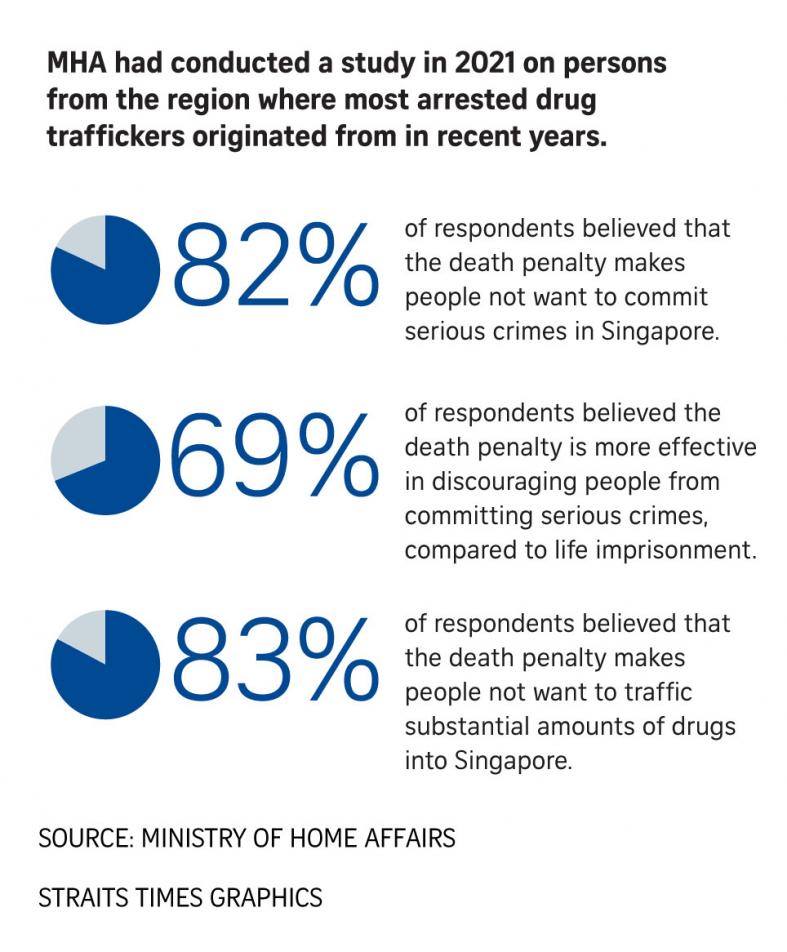Over 80% of S'poreans polled believe death penalty deterred offenders: Shanmugam
There is strong support for the death penalty in Singapore, Minister for Home Affairs and Law K. Shanmugam said on Thursday (March 3).
And even people from regions where most drug traffickers are from believe it deters trafficking and serious crimes.
In his speech during the Budget debate, he said the death penalty continues to remain relevant here.
The minister cited a study conducted last year by the Ministry of Home Affairs (MHA) on Singaporean perceptions on the death penalty. He said preliminary results showed that more than 80 per cent believed the death penalty had deterred offenders.
Most respondents also felt the mandatory death penalty was appropriate for intentional murder (81 per cent), firearm offences (71 per cent) and drug trafficking (66 per cent).
He said: "In our view, (the death penalty) has had a strong, clear, deterrent impact.
"We prefer not to have to impose the death penalty on anyone, but we have to continue to do what is best for us as a matter of policy."
Several MPs had asked about the role of the death penalty in Singapore today and how effective it has been in keeping crime rates down.
Mr Shanmugam said the criminal justice system here has various objectives, including to deter crimes, provide proportionate punishment for offenders, protect public safety and rehabilitate ex-offenders.
And the death penalty quickly brought down the rates for kidnapping, firearm robberies, and drug trafficking.
He said for kidnapping, there was an average of 29 cases a year from 1958 to 1960. But when the death penalty was introduced for the crime in 1961, the number of cases immediately fell to an average of just one a year on average for the next three years. It has remained low ever since.
For robberies involving firearms, there were 174 such cases in 1973, and the death penalty was introduced for the offence at the end of that year. Within a year, cases fell to 106 in 1974 and continued to decline sharply in subsequent years. Such offences are now extremely rare, with only three cases reported since 2000.
Addressing the issue of the death penalty for drugs, Mr Shanmugam said the MHA had conducted a study surveying people from places in the region where most arrested drug traffickers here are from. He said these were not Singaporeans.
About 82 per cent of those surveyed believed the death penalty in Singapore made people not want to commit serious crimes.
About 69 per cent said the death penalty was more effective than life imprisonment in deterring people from committing serious crimes.
And about 83 per cent said the death penalty made people not want to traffic substantial amounts of drugs in Singapore.

The minister also mentioned another study by MHA in 2018, which found that convicted drug traffickers were highly aware of the death penalty. And this had influenced their drug trafficking behaviour.
Mr Shanmugam said one of the traffickers in this study had said he knew very clearly that if he were caught trafficking a small amount, he would just go to jail for trafficking.
But if he were caught with a larger amount, he would be at risk of the death penalty.
"And so he trafficked below the threshold amount," said Mr Shanmugam.
The minister added that drugs affect more than just the abusers.
He said: "The impact of drugs on innocent children, babies, is rarely ever discussed.
"Drug traffickers profit from destroying these children and their families. Where should our sympathies be placed?"
Get The New Paper on your phone with the free TNP app. Download from the Apple App Store or Google Play Store now



